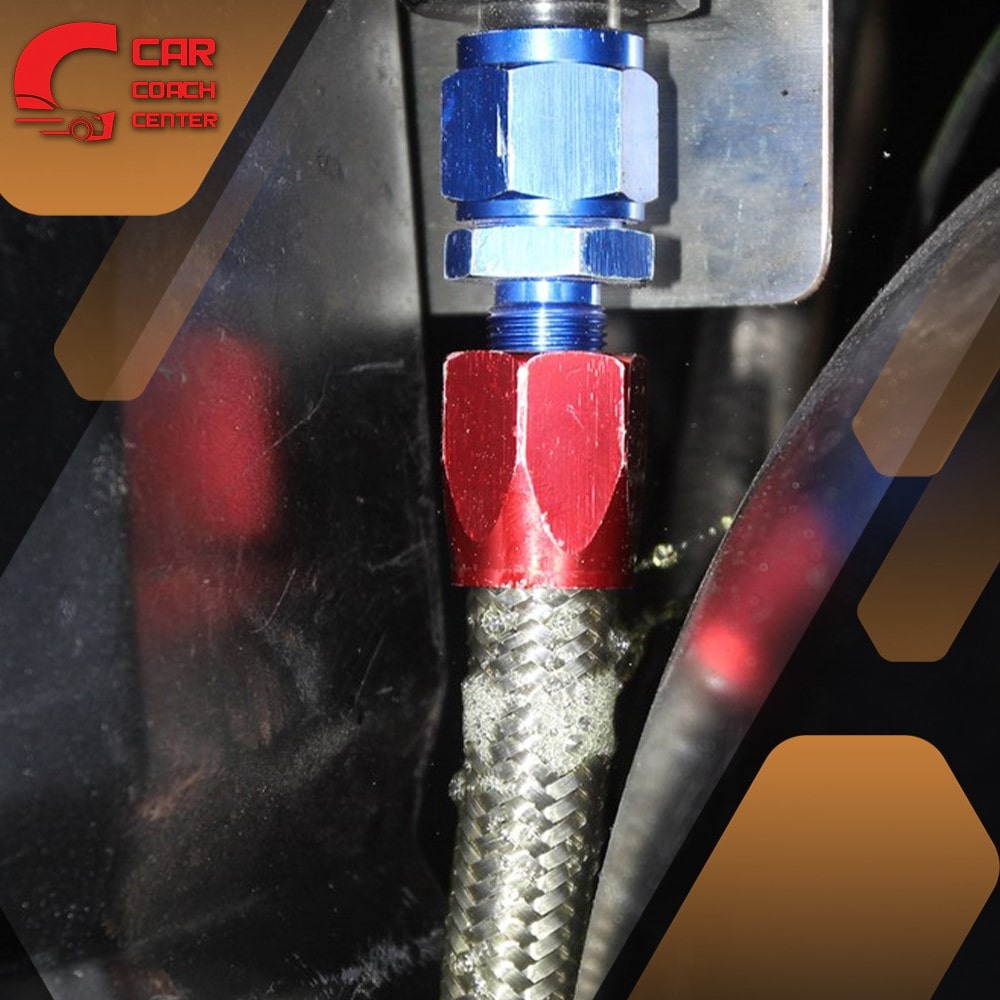Can You Drive With A Leaking Fuel Line
Driving a vehicle with a leaking fuel line can pose serious risks and consequences that should not be ignored. The fuel line is a critical component responsible for delivering gasoline from the fuel tank to the engine, ensuring smooth operation and optimal performance. However, when a fuel line develops a leak, it can lead to various potential dangers.
This article will delve into the implications of driving with a leaking fuel line and provide valuable insights into identifying such issues. We will explore the immediate steps to take upon discovering a fuel line leak and discuss whether temporary fixes are viable.
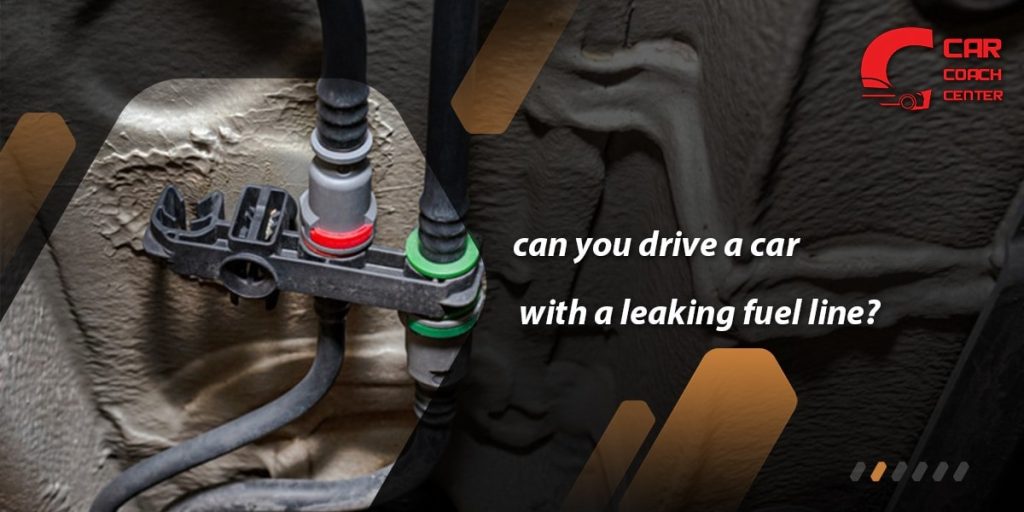
Additionally, we will examine the consequences of driving with a leaking fuel line, including the impact on the vehicle’s performance and safety. To conclude, we will provide preventive measures to help drivers avoid fuel line leaks. By understanding the risks and taking appropriate action, you can ensure your vehicle’s safety and longevity.
The Dangers of Ignoring a Leaking Fuel Line
Ignoring a leaking fuel line in your vehicle can have severe consequences beyond mere inconvenience. Understanding the potential dangers associated with driving a car with a fuel line leak is crucial to prioritize prompt action.
Fire Hazard
One of the most significant dangers of a leaking fuel line is the increased fire risk. Fuel leaks can release highly flammable gasoline, which can be ignited by even the smallest spark or heat source. This can lead to catastrophic consequences, endangering the lives of the driver, passengers, and other motorists on the road.
Loss of Fuel Efficiency
A leaking fuel line often results in fuel wastage. As gasoline seeps out of the damaged line, your vehicle’s fuel efficiency takes a hit. Not only does this drain your wallet by requiring more frequent refueling, but it also harms the environment due to increased emissions.
Engine Performance Issues
A compromised fuel line can disrupt the fuel supply to the engine, leading to various performance issues. Insufficient fuel reaching the engine can cause misfires, stalling, hesitation, and decreased power. These problems can severely impact the drivability of your vehicle, making it unreliable and potentially unsafe.
Damage to Other Vehicle Components
Fuel leaks can negatively affect surrounding components. Gasoline can erode rubber hoses, electrical wiring, and other parts near the leak. Over time, this damage can lead to more extensive and costly repairs.
Health Risks
Fuel vapors emitted from a leaking fuel line can be harmful when inhaled. Prolonged exposure to these fumes can lead to dizziness, nausea, headaches, and respiratory issues. In extreme cases, exposure to gasoline vapors can even cause more severe health complications.
Legal and Safety Concerns
Driving with a known fuel leak can put you at risk of legal repercussions. In many jurisdictions, operating a vehicle with a known safety hazard is considered a violation of the law. Ignoring a fuel line leak compromises your safety and can result in fines or penalties if discovered during routine inspections or after an accident.
Identifying a Leaking Fuel Line
Identifying a leaking fuel line is crucial for maintaining the safety and performance of your vehicle. Here are some key indicators to help you identify a potential fuel line leak:
Visual Inspection
Start by visually inspecting the fuel line. Look for any visible signs of fuel leakage, such as wet spots, stains, or drips under the vehicle, particularly near the fuel tank and along the fuel line route. Pay attention to any traces of gasoline odor as well.
Smell of Gasoline
A strong gasoline smell inside or outside the vehicle can indicate a fuel line leak. If you consistently notice this odor, it’s essential to investigate the source and take appropriate action.
Drop in Fuel Efficiency
If you notice a sudden drop in your vehicle’s fuel efficiency without any apparent reason, it could be a sign of a fuel line leak. Keep track of your fuel consumption and observe any unusual changes that cannot be attributed to driving conditions or other factors.
Engine Performance Issues
A leaking fuel line can disrupt the proper fuel supply to the engine, resulting in various performance issues. Look for symptoms such as engine misfires, rough idling, hesitation, or a lack of power during acceleration. These signs may indicate a compromised fuel line.
Puddles Under the Vehicle
Check the ground beneath your parked vehicle for any puddles or stains. If you consistently notice liquid pooling in the area where your car is parked, it could indicate a fuel line leak. Remember to distinguish between water condensation from the air conditioning system and gasoline leaks.
Unusual Sounds
A fuel line leak can sometimes cause hissing or spraying sounds near the fuel tank or engine compartment. If you hear any unusual noises that are out of the ordinary, it’s important to investigate the source promptly.
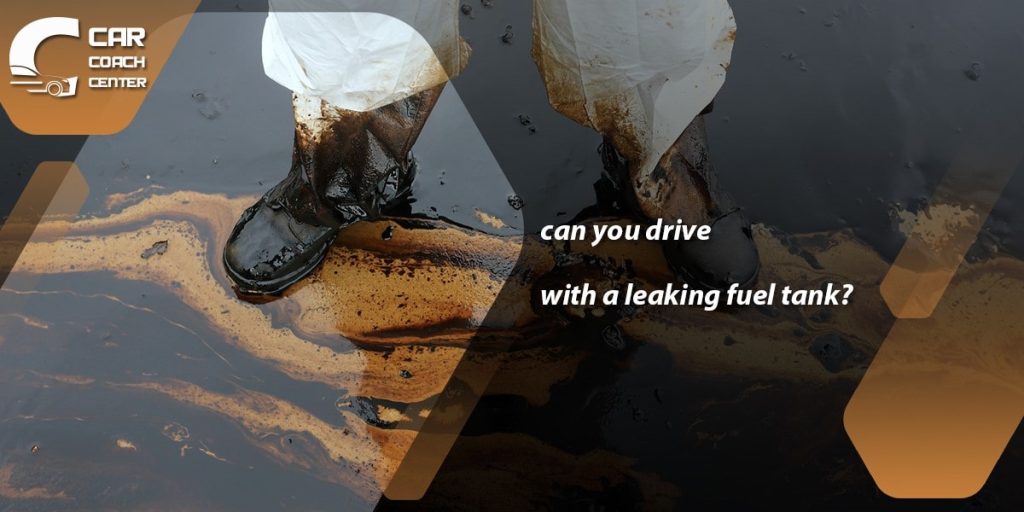
Immediate Steps to Take When You Discover a Leaking Fuel Line
Discovering a leaking fuel line in your vehicle requires prompt action to mitigate risks and ensure safety. Here are the immediate steps you should take when faced with this situation:
Prioritize Safety
The first and most crucial step is prioritizing safety. If you detect a fuel line leak while driving, safely pull over to the side of the road or find a well-ventilated area away from traffic. Turn off the engine and remove the key from the ignition to eliminate potential ignition sources.
Avoid Open Flames and Sparks
Gasoline is highly flammable, so it is important to avoid open flames, sparks, or any potential ignition sources. This includes refraining from smoking, using cell phones, or operating electrical devices near the leak.
Do Not Attempt Repairs
It is vital to refrain from attempting any repairs or modifications to the fuel line yourself, especially if you lack the necessary expertise. Handling fuel lines requires specialized knowledge and equipment. Attempting to fix the issue yourself could exacerbate the problem or lead to accidents.
Contain and Clean Spills
If there is a significant fuel leak and you have the means to do so safely, you can consider using an absorbent material, such as cat litter or sand, to contain and soak up the spilled fuel. Be cautious not to spread the fuel further or contaminate the environment.
Call for Professional Help
Once you have taken immediate safety measures, contact a professional towing service or roadside assistance provider to transport your vehicle to a trusted mechanic or repair facility. Inform them about the fuel line leak so they can take appropriate precautions when handling your vehicle.
Inform Mechanic/Technician
When you reach the repair facility, communicate the details of the fuel line leak to the mechanic or technician. Please provide them with any observations, symptoms, or diagnostic information you have gathered. This will assist them in efficiently diagnosing and addressing the issue.
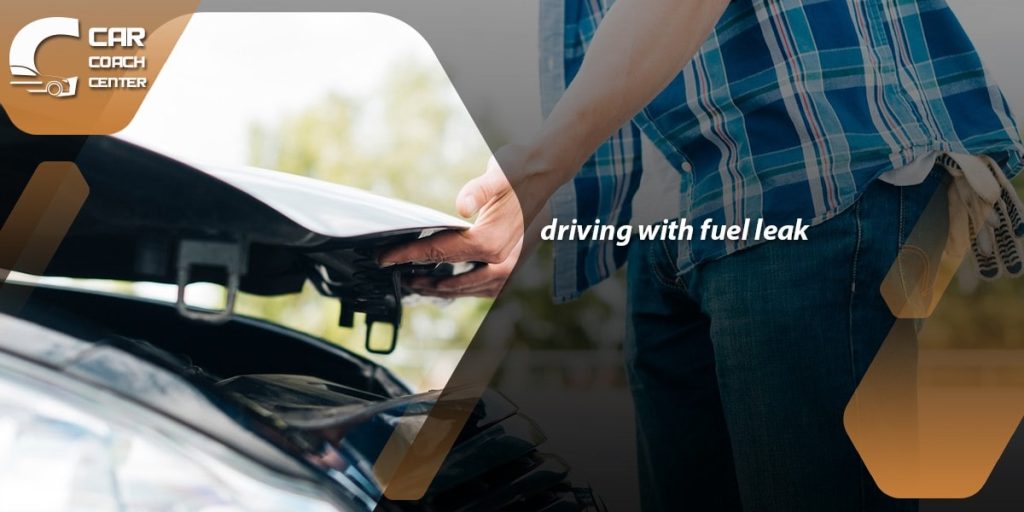
Can You Temporarily Fix a Leaking Fuel Line?
Discovering a leaking fuel line in your vehicle can be a cause for concern, especially if immediate professional assistance is not readily available. While it is generally recommended to have a qualified mechanic address the issue promptly, there are a few temporary measures you can consider if circumstances require you to fix a leaking fuel line temporarily. However, it’s important to note that these solutions should only be seen as temporary, not long-term fixes. Here are a few options to consider:
Fuel Line Repair Kit
Some automotive supply stores offer fuel line repair kits that include materials like rubber hoses, clamps, and connectors. These kits are designed for temporary fixes and can be useful in emergency situations. Follow the instructions provided with the kit carefully to make a temporary repair. However, remember that this is not a permanent solution and should be addressed by a professional as soon as possible.
Hose Clamps and Emergency Patching
If the leak is located in a reachable area and the damage is minimal, you may be able to use hose clamps to secure the leak temporarily. Place a clamp tightly around the damaged section of the fuel line, ensuring a secure fit. Another option is to use an emergency fuel line repair patch, which can be wrapped around the leaking area to provide a temporary seal. These methods can help contain the leak until you can get professional help, but they are not long-term fixes.
Sealants and Epoxy
Fuel-resistant sealants and epoxy products are available on the market that can temporarily seal small fuel line leaks. Apply the sealant or epoxy directly to the damaged area, following the manufacturer’s instructions. Remember that these products are not designed for permanent repairs and may only offer a temporary solution until a proper fix can be implemented.
Consequences of Driving with a Leaking Fuel Line
Driving a vehicle with a leaking fuel line can have a range of detrimental consequences that can impact your safety and overall performance. It is important to be aware of these potential outcomes to understand the gravity of the situation. Here are some key consequences to consider:
Fire Hazard
One of the most severe risks associated with driving with a fuel line leak is the increased potential for a fire. Gasoline is highly flammable; even a small spark or heat source can ignite the leaked fuel, leading to a dangerous fire. This endangers your life and puts other motorists and pedestrians at risk.
Compromised Safety
A leaking fuel line compromises the safety of everyone in the vehicle. Fuel leakage can intensify in a collision or sudden stop, increasing the risk of fire and injuries. Additionally, fuel odors and vapors can be harmful when inhaled, affecting the respiratory system and potentially causing dizziness, nausea, or other health issues.
Decreased Fuel Efficiency
A leaking fuel line causes fuel wastage, resulting in decreased fuel efficiency. As gasoline leaks out, you may need to refuel more frequently and spend more money on gas. This affects your wallet and contributes to unnecessary environmental pollution due to increased emissions.
Engine Performance Issues
A compromised fuel line disrupts the consistent flow of fuel to the engine, leading to various performance problems. These may include engine misfires, rough idling, reduced power during acceleration, and overall decreased performance. Ignoring a fuel line leak can gradually damage your engine and other related components, resulting in costly repairs.
Environmental Impact
Fuel leaks from a vehicle contribute to environmental pollution. Gasoline that escapes from a leaking fuel line can contaminate soil and water sources and affect local ecosystems. The release of harmful emissions also contributes to air pollution, negatively impacting the environment and human health.
Legal Consequences
Driving a vehicle with a known safety hazard, such as a leaking fuel line, can lead to legal consequences. In many jurisdictions, operating a vehicle unsafe is against the law and may result in fines, penalties, or even license suspension. Neglecting to address a fuel line leak puts you at risk and exposes you to potential legal trouble.
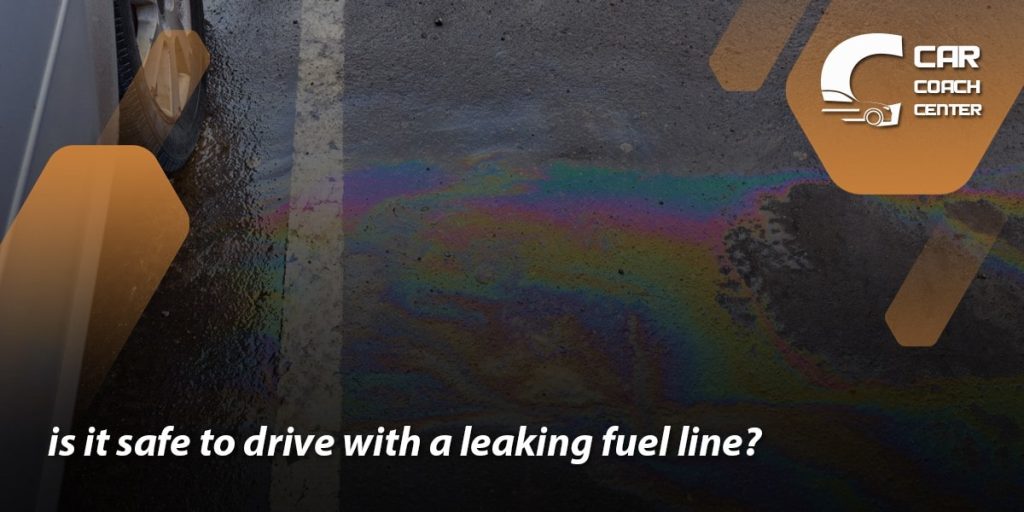
Preventive Measures to Avoid Fuel Line Leaks
Taking preventive measures to avoid fuel line leaks is essential for maintaining the safety and reliability of your vehicle. Adopting a proactive approach can minimize the risk of experiencing fuel line leaks. Here are some preventive measures to consider:
Regular Inspections
Perform regular visual inspections of your vehicle’s fuel system, including the fuel lines, connections, and fittings. Look for signs of wear, corrosion, or damage. Please address any issues promptly to prevent them from escalating into fuel line leaks.
Proper Installation
During vehicle maintenance or repairs involving the fuel system, ensure that all components, including fuel lines, are installed correctly. Improper installation can lead to fuel leaks. Consult a qualified mechanic or technician if you need more confidence.
Avoid Physical Damage
Be cautious when working around the engine compartment or underneath the vehicle. Avoid accidentally hitting or damaging the fuel lines, as physical damage can compromise their integrity. Use care when handling tools and other equipment to minimize the risk of unintentional damage.
Avoid Excessive Vibration
Excessive vibration can cause fuel lines to loosen or develop cracks over time. Take steps to minimize excessive vibration, such as avoiding rough roads whenever possible and promptly addressing any issues with suspension components or engine mounts.
Proper Fuel Handling
Be mindful of fuel handling practices to prevent contamination and corrosion. Use clean and approved containers for fuel storage, and avoid introducing foreign substances into the fuel system. Additionally, ensure the fuel cap is tightly secured after refueling to maintain system pressure and prevent leaks.
Fuel Additives
Consider using fuel additives designed to maintain the cleanliness of the fuel system. Some additives help prevent fuel line corrosion and the accumulation of deposits that can lead to clogs or leaks. Follow the manufacturer’s recommendations when using fuel additives.
Regular Maintenance
Adhere to your vehicle’s recommended maintenance schedule, including fuel system inspections, filter replacements, and fuel line checks. Regular maintenance can help identify potential issues early on and prevent fuel line leaks from occurring.
Conclusion
In conclusion, driving with a leaking fuel line is a hazardous practice that can lead to severe consequences for your safety and your vehicle’s performance. The risks associated with fuel line leaks include fire hazards, compromised safety, decreased fuel efficiency, engine performance issues, environmental impact, and potential legal consequences. It is essential to promptly address fuel line leaks by seeking professional help and refraining from driving until the issue is resolved.
At CarCouchCenter.com, we prioritize your safety and encourage proactive measures to prevent fuel line leaks. Regular inspections, proper installation, avoiding physical damage and excessive vibration, practicing proper fuel handling, using fuel additives, and adhering to regular maintenance schedules are crucial preventive measures.
By implementing these measures and taking immediate action when needed, you can ensure your vehicle’s reliability, longevity, and safety. Remember, your safety and the safety of others on the road should always be a top priority. Visit CarCouchCenter.com for more valuable automotive insights and resources to keep your vehicle in optimal condition.
Can I drive with a leaking fuel line?
No, driving with a leaking fuel line is highly dangerous and poses significant risks, including fire hazards and compromised safety.
How can I identify a leaking fuel line?
Look for visual signs of fuel leakage, such as wet spots or stains under the vehicle, a strong smell of gasoline, decreased fuel efficiency, and engine performance issues.
Can I temporarily fix a leaking fuel line?
While temporary fixes like fuel line repair kits or sealants can be used in emergencies, they should only serve as short-term solutions.

